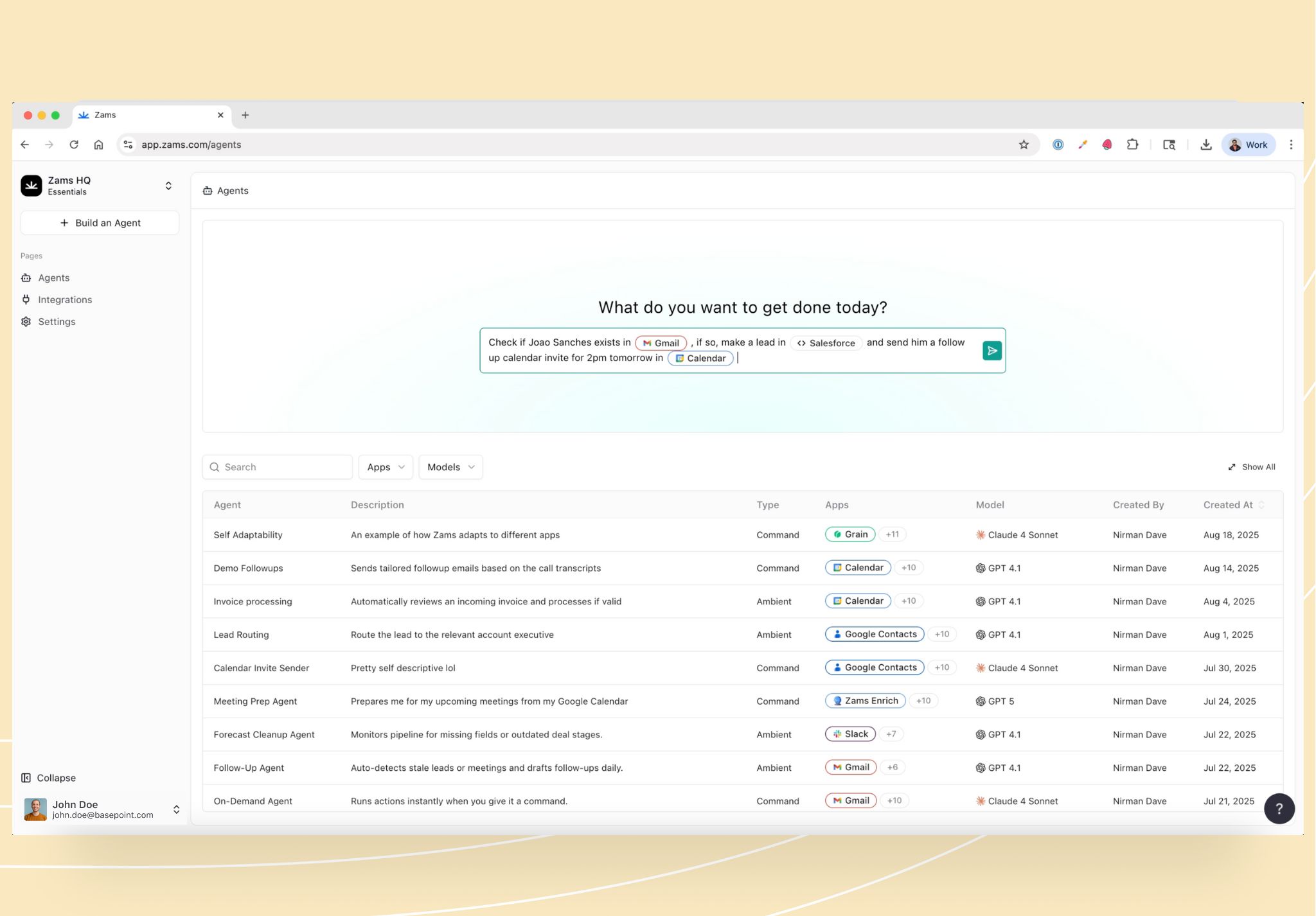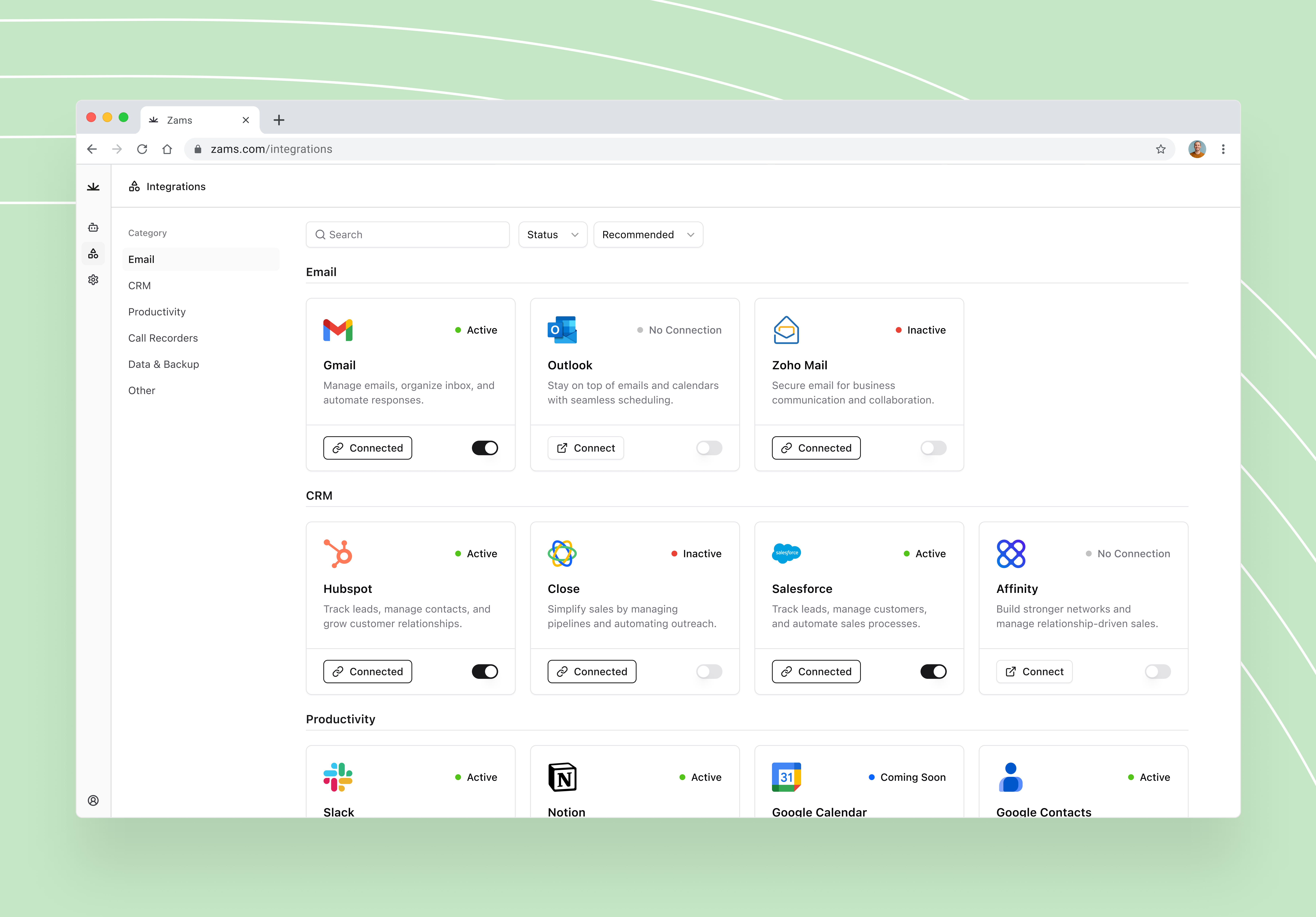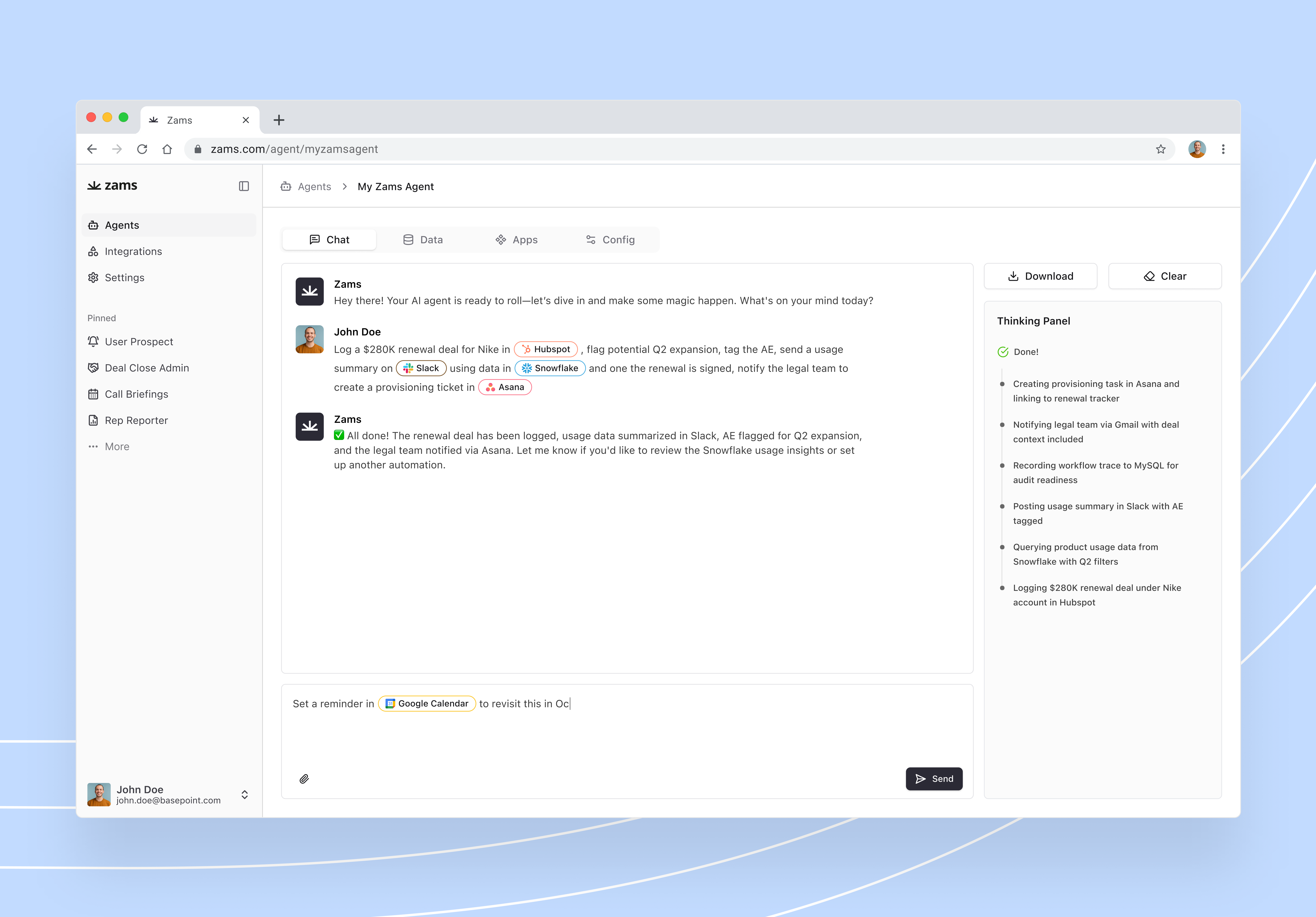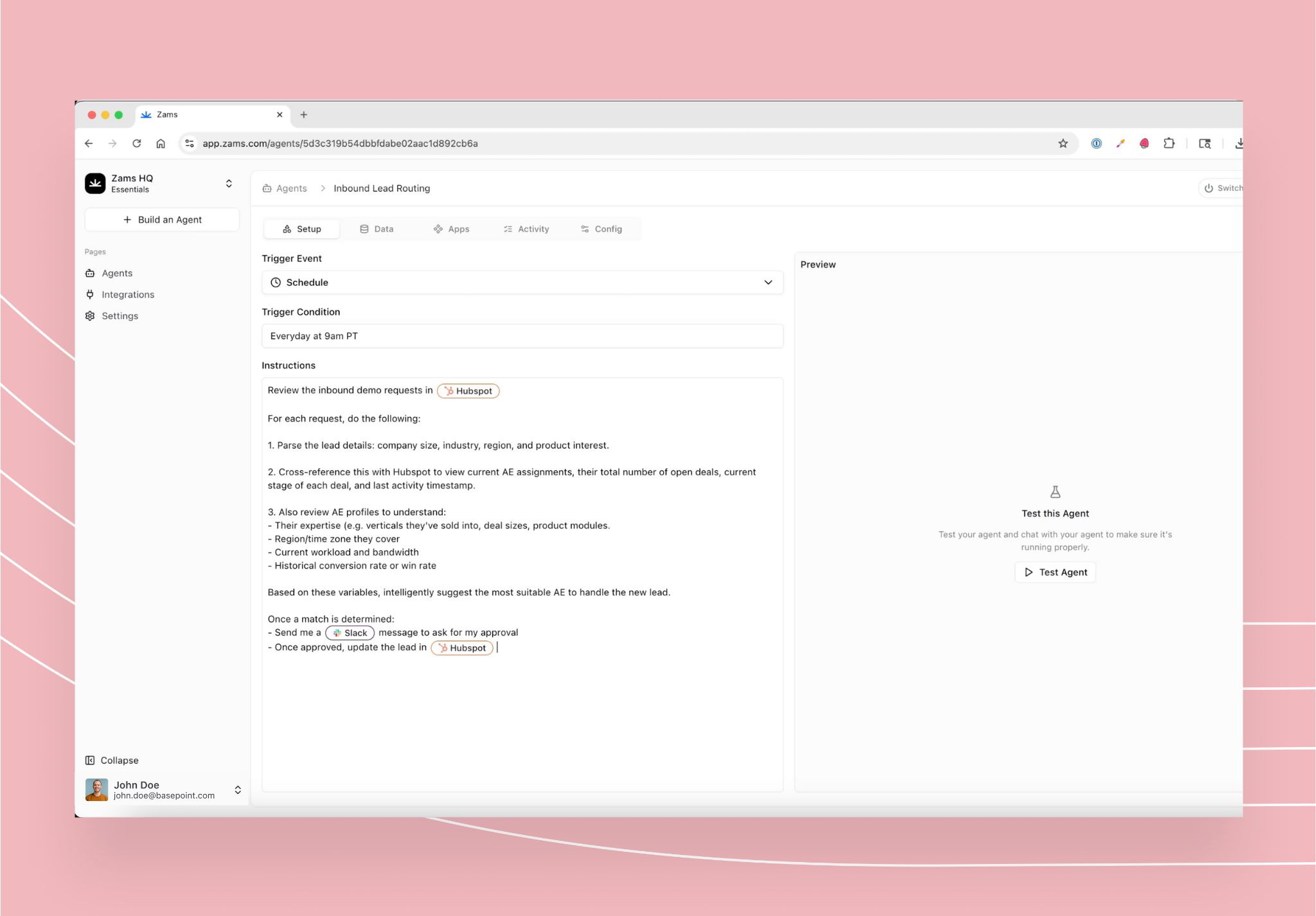What is Automated Sales?
AI Sales refers to the use of artificial intelligence sales tools to enhance every stage of the sales cycle making the process more efficient, data-driven, and scalable. Instead of spending hours on repetitive tasks, sales teams can now rely on AI sales tools to automate lead generation, follow-ups, and customer analysis. Platforms like HubSpot and Salesforce, provide predictive insights that help reps prioritize opportunities, personalize outreach at scale, and make smarter decisions faster.
By integrating AI tools for sales into existing workflows, businesses unlock the ability to forecast revenue more accurately, improve conversion rates, and strengthen customer relationships. In short, AI sales platforms aren’t just about working harder they’re about selling smarter, giving teams the competitive edge needed to drive sustainable growth.
Ready to Transform Your Sales With Automation?
Stop wasting time on repetitive tasks. Zams connects with 100+ tools to automate outreach, scoring, and follow-ups, so your team can focus on closing deals.
Why Businesses Need Artificial Intelligence Sales Tools
The modern sales cycle is fast-paced, data-driven, and increasingly digital. To stay competitive, businesses are embracing artificial intelligence sales tools that automate tasks, optimize workflows, and improve performance across every stage of the customer journey. These tools help sales teams focus on strategy and relationships rather than manual processes leading to faster conversions and scalable growth.
A key factor in unlocking the full potential of AI is CRM integration. By connecting with platforms like Affinity, Attio, or Close, AI tools can access rich customer data to deliver predictive analytics, personalized recommendations, and intelligent automation. Zams supports seamless integration with these systems, enabling features like smart contact updates, automated segmentation, and real-time sales insights turning your CRM into a powerful engine for growth.
Efficiency: Automating Repetitive Tasks
AI sales tools are revolutionizing the way sales teams operate by taking over the repetitive, time-consuming tasks that once bogged down the sales process. By leveraging artificial intelligence and machine learning, these sales tools can handle everything from eliminating manual data entry to automating lead qualification and follow-up emails. This means sales reps spend less time on administrative work and more time on what truly matters—building relationships and closing deals. For example, an AI-powered tool can automatically update CRM records after a sales call, schedule meetings based on customer availability, and even send personalized follow-up messages. By streamlining sales processes and freeing up valuable time, AI sales assistants empower sales teams to focus on high-value customer interactions and strategic growth.
Accuracy: Better Forecasting and Lead Scoring
One of the standout advantages of AI sales tools is their ability to deliver more accurate sales forecasting and lead scoring. By analyzing vast amounts of sales data, AI-powered tools can uncover patterns and trends that might go unnoticed by human eyes. This enables sales teams to make data-driven decisions, prioritize the most promising leads, and refine their sales strategies for better results. Predictive lead scoring, powered by artificial intelligence, helps sales reps identify which prospects are most likely to convert, ensuring that time and resources are focused where they’ll have the greatest impact. Additionally, advanced sales forecasting tools provide actionable insights into future revenue streams, allowing teams to set realistic targets and improve overall sales performance. With AI tools delivering these insights, sales teams can operate with greater confidence and precision.
Personalization: Tailoring Building Relationships
Personalization is at the heart of successful selling, and AI sales tools are making it easier than ever for sales teams to deliver tailored customer experiences. By analyzing customer data and tracking behavior across multiple touchpoints, AI-powered tools provide sales reps with valuable insights into individual preferences, needs, and buying signals. This enables teams to craft personalized marketing content, respond to customer interactions in real time, and deliver targeted outreach that resonates. For instance, AI-driven chatbots can engage prospects instantly, while automated email campaigns can be customized for each recipient based on their unique journey. By leveraging these valuable insights, sales teams can build stronger relationships, increase engagement, and ultimately drive more sales.

Types of Automated Sales Tools
The landscape of AI sales tools is diverse, with each type designed to address specific challenges within the sales process. AI sales assistants are invaluable for automating routine tasks, such as scheduling meetings and managing follow-ups, allowing sales teams to focus on high-impact activities. Sales engagement platforms enable personalized outreach at scale, ensuring consistent and meaningful customer interactions across multiple channels. Pipeline management tools provide real-time visibility into every stage of the sales process, helping teams track progress and identify bottlenecks before they become issues. Conversation intelligence platforms analyze sales conversations, offering actionable insights that can improve sales performance and coaching. When integrated with existing sales software like CRM systems, these AI-powered tools create a unified view of customer interactions, streamline workflows, and empower sales teams to close more deals with greater efficiency.
Best Automated Tools Growth Apps in 2025: HubSpot Sales Hub and Salesforce Sales Cloud
Looking ahead to 2025, the best AI sales growth apps will be those that deliver measurable ROI, integrate effortlessly with existing sales tools, and provide deep, actionable insights into customer behavior. Leading platforms such as HubSpot Sales Hub and Salesforce Sales Cloud are setting the standard with features like predictive lead scoring, advanced sales forecasting, and robust conversation intelligence. These AI-powered tools help sales teams automate routine tasks, analyze sales conversations for improvement opportunities, and personalize customer interactions at scale. By adopting these cutting-edge AI tools, sales teams can enhance their sales performance, build stronger customer relationships, and stay ahead of the competition in a rapidly evolving market.

Best Automated Sales Growth Apps in 2025
Sales teams are no longer limited to traditional CRMs or manual prospecting methods. The rise of intelligent applications has given birth to the best AI sales growth apps, designed to accelerate pipeline development and revenue growth.
Here are some categories of AI-powered apps that are making the biggest impact in 2025:
Lead Generation & Contact Management
AI-driven lead gen tools identify high-potential prospects with surgical precision. With integrations like Affinity, Zams helps you spot stale deals, sync relationship notes into your CRM, and even create new contacts and opportunities automatically, pulling in the right people before your rep even asks.
- Conversation Intelligence & CRM Sync
Capture every drop of insight from your customer interactions. Using Zams with tools like Close, you can sync call summaries to deal records in real time, notify finance when a deal closes, and update lead statuses automatically—so nothing slips through the cracks.
- Productivity & Outreach Across Channels
Multi-channel consistency is key to winning. Zams powers integrations like Gmail to send personalized intro emails, auto-log messages into your CRM, and even schedule renewal reminders, all without manual effort. And with Google Calendar, you can set auto-blocked “no-meeting zones,” trigger prep checklists before key calls, and log outcomes after every client touch.
- Centralized Database & Reporting
Need insights across your data stack?
Zams integrates with Azure Datalake to export qualified leads and generate on-demand sales reports, or even automate data cleansing routines so your data stays sharp and actionable.
By adopting the best AI sales growth apps, companies can accelerate their sales cycle, reduce wasted effort, and close more deals in less time. In 2025, the businesses that integrate these intelligent tools into their workflows are the ones setting the pace for growth.
Ready to transform the way your team sells? Zams is the AI command center that streamlines workflows, boosts productivity, and unlocks new revenue. Whether you need AI sales assistants or the right tools to hit quota, Zams plugs seamlessly into your stack.
Data Enrichment and Management in Automated Sales: Eliminating Manual Data Entry
In the age of AI sales, clean and enriched data is what unlocks smarter decisions and scalable growth. Modern sales teams are turning to artificial intelligence sales tools not just to capture information, but to automatically refine and enrich it ensuring every lead, opportunity, and customer interaction is accurate, actionable, and ready to drive results.
Through Zams integrations, managing and enriching data becomes seamless. With Azure Data Lake, teams can export qualified leads, automate data cleansing routines, and generate real-time reports that feed directly into CRMs like HubSpot or Salesforce. Meanwhile, productivity integrations such as Gmail and Google Calendar ensure every conversation and meeting is automatically logged, giving sales reps complete, enriched records without manual effort.
By combining AI tools for sales with powerful integrations, businesses gain a single source of truth that fuels predictive insights, stronger forecasting, and scalable growth—turning raw information into a competitive advantage.ols for Sales Teams
For today’s sales teams, time is the most valuable resource. AI tools for sales make it possible to do more with less by handling repetitive work and surfacing insights that help reps close deals faster. Sales agents, in particular, benefit from these tools by optimizing their email communications and managing tasks more efficiently. Instead of spending hours logging calls or updating spreadsheets, AI takes care of these tasks in the background, letting reps focus on building relationships. Some AI tools can even automate data entry and updates in Google Sheets, streamlining workflow even further.
The real magic happens when these tools connect with CRMs like HubSpot, Salesforce, or Zoho. With AI seamlessly integrated, teams can see predictive lead scores, real-time deal forecasts, and even personalized suggestions for the next step all directly inside their CRM. This creates a smoother workflow and ensures data is always accurate.
The benefits vary depending on the size of the team. Small businesses gain a digital “extra hand” that allows them to scale without immediately hiring more staff. Enterprise teams, on the other hand, get consistency across hundreds of reps and deeper analytics to guide strategy. In both cases, AI is not replacing salespeople it’s making them sharper, faster, and more effective.

Automated Sales Platforms: All-in-One Solutions
As sales stacks grow more complex, the demand for all-in-one AI sales platforms is rising. Instead of stitching together multiple tools for lead generation, outreach, and analytics, these platforms bring everything under one roof simplifying workflows and boosting team performance.
With integrations into CRMs like HubSpot and Salesforce, AI sales platforms connect prospecting, conversation intelligence, and pipeline management into a single ecosystem. Add in productivity apps like Gmail and Google Calendar, and reps can move seamlessly from first touch to closed deal without losing data or context.
What sets all-in-one AI sales platforms apart is their ability to surface insights across the entire customer journey predicting the right accounts to target, automating handoffs between teams, and ensuring leaders always have real-time visibility into revenue health.
For modern businesses, these platforms aren’t just a convenience they’re a growth engine, aligning people, processes, and artificial intelligence tools into one unified solution.
The Rise of Automated Sales Assistants
The new generation of sales AI assistants is reshaping how sales teams operate day to day. Unlike traditional automation tools, these assistants act as real-time partners—listening, learning, and guiding reps throughout the sales cycle.
Powered by natural language processing and machine learning, sales AI assistants can draft personalized follow-up emails, summarize complex meetings into action items, and even suggest the best next step for advancing a deal. They function less like static software and more like dynamic colleagues, reducing the mental load on sales reps while amplifying their impact.
What makes these assistants especially powerful is their adaptability. As they gather more data, they refine recommendations, identify hidden opportunities, and help sales leaders coach their teams with pinpoint precision. For many organizations, adopting a sales AI assistant is no longer a “nice-to-have”—it’s quickly becoming essential for staying competitive in a fast-moving market.
Future of Automated in Sales
The future of AI in sales is not just about automation it’s about transformation. As AI sales tools become more sophisticated, they are evolving from simple task managers into strategic advisors that can forecast customer behavior, predict deal outcomes, and even guide reps in real time during negotiations. In the coming years, we can expect AI sales platforms to integrate even deeper into the sales process, combining conversation intelligence, predictive analytics, and hyper-personalization into a single seamless experience. Advanced sentiment analysis will also play a key role in understanding customer emotions and improving sales outcomes.
This evolution will inevitably impact the role of sales professionals. Far from replacing them, AI will free reps from repetitive tasks and empower them to focus on high-value interactions, building stronger relationships with customers. The result? A richer, more personalized customer experience driven by data and insights rather than guesswork. At the same time, businesses that adopt AI software sales solutions early will gain a competitive edge, leveraging advanced tools to shorten sales cycles and boost revenue.
Now is the perfect moment to invest in AI-powered selling. The technology has matured enough to deliver measurable ROI, yet the competitive landscape is still open enough for early adopters to stand out. Companies that hesitate risk being left behind as AI becomes the standard in modern sales. In short, the future of sales is not just human it’s human plus AI, working together to close more deals and create lasting customer value.

Automated Sales: From Tools to Transformation
The rise of AI sales tools, AI sales platforms, and sales AI assistants has redefined what it means to succeed in modern sales. No longer just nice-to-have add-ons, these technologies are now essential for any company that wants to compete in a fast-paced, data-driven market. From automating follow-ups and analyzing conversations to predicting customer behavior and improving personalization, AI-powered selling is transforming the way teams connect with prospects and close deals.
The message is clear: businesses that adopt artificial intelligence sales tools today will be tomorrow’s market leaders. By choosing the right solutions and integrating them strategically, organizations can empower their sales teams to work smarter, not harder, and deliver experiences that customers truly value.
The future of sales is already here and it’s powered by AI. Don’t let your team fall behind. Partner with Zams to explore the best AI sales tools tailored to your business needs, and start building a smarter, more efficient sales process today.
Close More Deals With Zams + Automated Sales
Automated sales isn’t the future, it’s here. Zams plugs into your CRM, email, and outreach tools to cut busywork and speed up revenue.
FAQ
What is automated sales and how does it work?
Automated sales uses artificial intelligence tools to streamline tasks like lead generation, follow-ups, forecasting, and CRM updates. By automating these processes, sales teams save time, reduce errors, and focus on building stronger customer relationships.
What are the biggest benefits of using AI sales tools?
Key benefits include faster lead qualification, accurate forecasting, 24/7 outreach, and personalized engagement at scale. These advantages help sales teams boost productivity, close deals faster, and drive sustainable revenue growth.
Which types of automated sales tools are most effective?
AI sales assistants, pipeline management software, sales engagement platforms, and conversation intelligence tools are among the most impactful. When integrated with CRMs like HubSpot or Salesforce, they provide a unified system for efficiency and growth.
Can automated sales tools replace human sales reps?
No. Automated sales tools are designed to complement, not replace, human reps. AI handles repetitive and data-heavy tasks, while humans focus on relationship-building, negotiation, and closing high-value deals.
What does the future of automated sales look like?
The future lies in AI-driven platforms that combine predictive analytics, conversation intelligence, and hyper-personalization. Sales teams will work alongside AI as a strategic partner, using data-driven insights to win more deals and enhance customer experiences.



